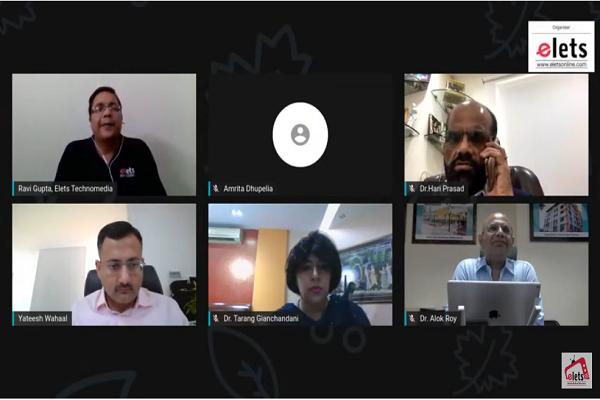
Corona crisis won’t go very soon and we will have to learn to deal with it in order to save lives of patients as well as staff. Being major healthcare providers, private healthcare is facing tough time in terms of revenue loss as hospital occupancy has lowest ever in recent times. These are essence of the panel discussion at eHealth webinar held recently.
Talking about how long the situation persist, Dr Tarang Gianchandani, CEO, Sir HN Reliance Foundation Hospital, Mumbai, said: “There is no immediate respite in sight, at least not for five to six months. By that time, we will learn to live with covid and find ways & means to manage healthcare. We need to protect our staff and patients. We have realised that most of the positive corona patients are found to be asymptomatic. Infection rate is very high but virulence or severance is not very high as comparison to some other viruses like SARS. Best way is to make it a friend and learn to deal with it,”

While participating during panel discussion on ‘Redefining Health Sector in Post Pandemic World’, Dr Alok Roy, Chairman & Managing Director, Medica Super specialty Hospital, Kolkata highlighted how hospitals faced issues initially and now well equipped to deal with it. “When the pandemic came, none of us were ready. We had no idea on how to handle it. When unknown things suddenly props to you, one gets scared. Healthcare workers including doctors, nurses and para medical staff have played a pivotal part to contain the disease. Despite facing huge loss and challenges at multiple fronts, private healthcare community is working out of its way to protect people from corona pandemic,” he said.
Also read: India to witness COVID-19 peak in mid-November: Study

Highlighting its impact on healthcare sector, Taran said: “There will be impact on healthcare and all other industry. Humans are by nature resilient. They know to move ahead in all circumstances. Impact will be there in care delivery, foot falls, morale of the people. But we need to change our point of view. We need to come out regular way of looking at hospitals. We need to change our mindsets.”
“We have made lots of infrastructural changes in the hospital. We completely change the way air conditioning work in the system. We change the way we work in the system. The biggest issue with this disease unlike other diseases which only affect patients, it also proves baneful for healthcare staff. Precautions have to be both ways. We have realised that this battle will last longer than we expected. But we are prepared for it. We are trying to adapt to tackle virus and save lives,” Roy further added.
Underlining issues of private providers, Dr Hari Prasad, President- Hospital Division, Apollo Hospitals, said: “The private sector provides 80-85 percent healthcare services. Many of the small hospitals have shut their shop. They are scared and worried to open up. Unless we help them to regain their confidence, get over their fears and start practicing with precautions to keep themselves safe, colleagues and patients, things won’t be like it was before covid.”
He said all focus has been shifted toward COVID and other severe diseases have not received attention. “Ever since, we have started counting covid case and death due to the pandemic, more number of patients have died due to heart attack, stroke, and cancer in the country. Somehow, covid seems to occupied everybody’s mind. Entire foundation of healthcare in this country has collapsed, it seems.”
Being optimistic Prasad further said, “In all the tertiary care hospitals, occupancy has gone down to 20-30 percent. This is because the scare created among public due to corona. I suggest healthcare providers–doctors, nurses and para medical staff should know little more about precautions. Hospitals are safer environment than any other environment in the city and village. People should not hesitate to come to hospitals out of scare and fear.”
“Five factors which matter to public are–looking at technology and virtual care, no rescheduling or if it happens fine being paid by hospital, covid-19 testing of patients after treatment, no waiting time, wants infection control protocol improved, and strict social distancing at care sites. We have to work on multiple fronts to get private healthcare back on track–to ally fear among people, living up to latest addition of expectations of patients, and strict safety guidelines. Tertiary care can’t survive with the solid foundation of primary and secondary care,” Prasad said.
Another panelist Yateesh Wahal, Executive Director, Nayati Healthcare & Research Pvt. Ltd, said, “While unlock 1.0 is on, still confidence is missing among healthcare fraternity. The volume in the OPD and elective, coming is low. In Delhi, the government has directed to share beds for Corona patients. We have allocated more beds to covid contrary to non covid patients. Though mortality is low, the virus is highly contagious. We have to co-exist both patients–covid and non covid. At the same time we need to undertake measures to let non covid patients get infected.”
“There should be post treatment covid test to safeguard against the infection. Recently we discharged 97-year covid patient at our facility in Agra. It is dedicated covid hospital. At Mathura, we are providing treatment for both–covid and non covid. Initially we have least idea on how to manage things, but today we have evolved to keep ourselves afloat. Additional safeguard have been put in place. Nobody is completely insulated against the spread of contagious virus. Primary and secondary players are suffering significantly because there is no support system in comparison to tertiary care which can leverage,Wahal further stated.
Be a part of Elets Collaborative Initiatives. Join Us for Upcoming Events and explore business opportunities. Like us on Facebook , connect with us on LinkedIn and follow us on Twitter , Instagram.












